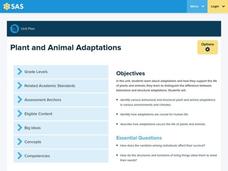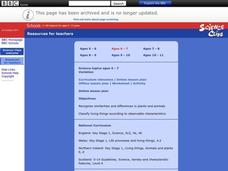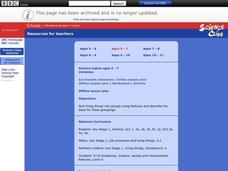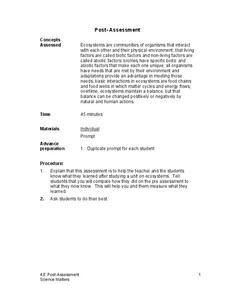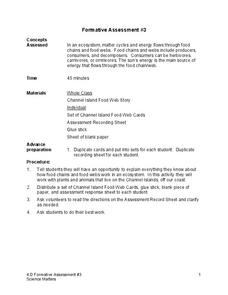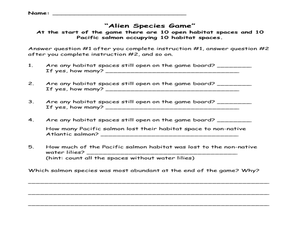Curated OER
Moving and Growing
Students know that humans and some other animals have bony skeletons inside their body. They know that other animals have skeletons on the outside of their bodies. They explain the role of both kinds of skeletons.
Pennsylvania Department of Education
Plant and Animal Adaptations
Fourth graders identify behavioral and structural adaptations to plant and animal life. In this unit overview, 4th graders discuss the importance of variation and adaptation in a species survival. This is a unit overview and does not...
Curated OER
Ourselves
Young scholars use a website to name and compare external body parts of humans and other animals.
Curated OER
Variation
Students participate in an online instructional activity to reinforce the similarities and differences in plants and animals. They classify living things according to observable characteristics.
Curated OER
Variation
Students practice sorting living things into groups using their characteristics. Using pictures of leaves and animals, they sort them based on their color and shape and write the objects characteristics under the picture. They share...
Curated OER
Insects
Students, through books, videos, and readings, explore characteristics of insects. In groups, they choose an insect to research. Students discover their insect's diet, how they move, and where they live. Afterwards, they use the facts...
Curated OER
Plant Growth
First graders investigate how seeds are moved and how plants grow. In this plant growth lesson, 1st graders listen to stories, play a game, and view a PowerPoint about plant growth. Students examine various seeds and recognize how they...
Curated OER
Lesson Plan for Cricket's Supper
Interested in a special folktale to read with your class? Then this lesson might be for you. Readers will build an understanding of the food chain while creating a storyboard that includes the characters, setting, and plot of the story....
Science Matters
Ecosystem Pre-Assessment
Test scholars' knowledge of ecosystems with a 20-question pre-assessment. Assessment challenges learners to answer multiple choice questions, read diagrams, and complete charts.
Science Matters
Post-Assessment
Twenty questions make up an assessment designed to test super scientists' knowledge of ecosystems. Scholars answer multiple-choice and short-answer questions about organisms, food chains, energy flow, and more.
Science Matters
Lotusland
It's time for a field trip! Scholars take their new-found knowledge of adaptations and seed dispersal on a field trip to a local botanical garden. They gain an up-close look at how ecological interdependence works in a distinct...
Science Matters
Formative Assessment #3
Thirteen short-answer questions follow a brief food web activity in a formative assessment designed to test knowledge of ecosystems and the energy that flows through them.
Curated OER
Salmon and the Non-Native Species
Students investigate the affect of non-native species on Pacific Salmon. In this non-native species and Pacific Salmon lesson, students participate in a competition and habitat loss game. They play the game in groups, while answering...
Curated OER
The Compost Bucket
Students recognize that plants and soils have a close relationship. They view a photo essay on the common practice and natural process of composting. Afterwards, they observe the process of plant decay over the course of several days.
Curated OER
Organic and Inorganic Waste
Students conduct a scientific investigation about organic or inorganic waste. For this organic or inorganic waste lesson, students create a compost heap to determine the difference between inorganic and organic waste. Students record...
What affects Frog metamorphosis?
In this lab, students explore pollutants which affect frog metamorphosis using household pollutants (vinegar, oil, and bleach) and sponge capsules.
Curated OER
Populations – The Survival of the Fittest (Part 1)
Students explain in their own words why organisms live together. In this biology instructional activity, students model what happens to organisms if their environment changes. They explain the importance of evolution.
California Academy of Science
Composting: A Scientific Investigation: California Academy of Sciences
Garbage, recycle, compost: Does it really matter where we put our trash once we are done? By making detailed observations over seven weeks, kids will see which materials break down naturally to become a healthy part of the soil, and...
Curated OER
Plant Power
Here is an opportunity for your first graders to take a close look at plants: what they need to survive, how they grow, and the names of each plant part. The book, Corduroy's Garden is used to open the lesson. Then, youngsters utilize...
Curated OER
Butterflies
In this science and reading comprehension worksheet, students read a 1 page detailed passage about butterflies. Students then answer 7 questions.
Polar Trec
Foraging for Fish in a Melting Arctic
How much do you know about the black guillemot of the Arctic region? With great background information, images, and a quick discussion, the class will learn all about the plight of the foraging seabird as they play a fun game. First,...
PBS
Season Seeking
It's a time of change. A hands-on activity engages young scientists in a lesson highlighting the change of seasons. They brainstorm indicators of season changes in nature and then look for them. Next, they record observations in a field...
WK Kellogg Biological Station
Sounds of Selection
Do you want a creative and fun way to teach about natural selection? Hop to it by turning your middle school princes and princesses into frogs trying to catch as many bugs as possible in a Hungry Hungry Hippos style game. For high...
Curated OER
2nd Grade - Act. 25: Creature Creation
Create a creature using some of the characteristics of a real animal. Second graders will read a book from the "Froggy," series by Johnathan London to learn about the characteristics of frogs. After discussing and recording various...



